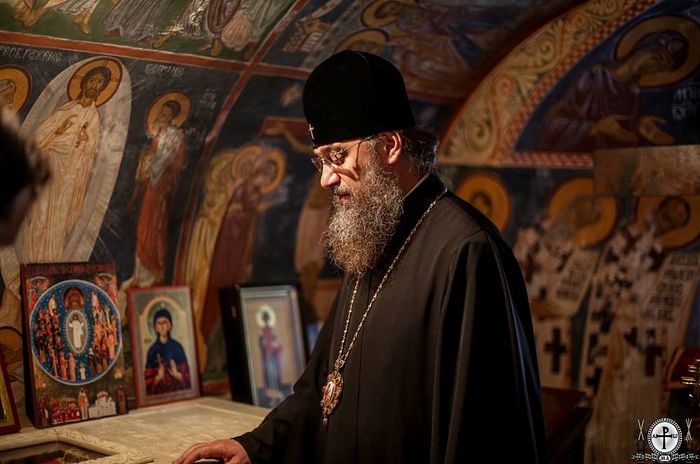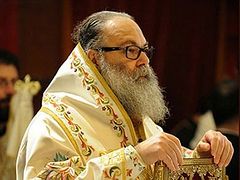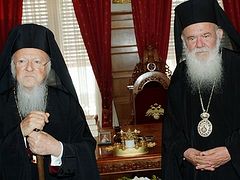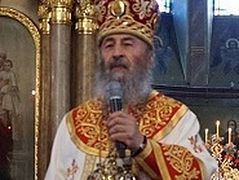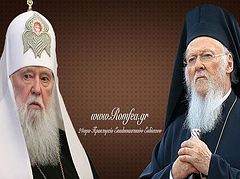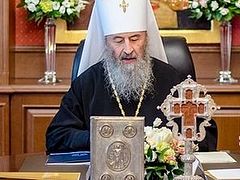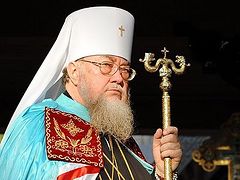Due to the commotion surrounding the question of autocephaly, the editors of “Pravoslavnaya Zhizn” asked the Chancellor of the Ukrainian Orthodox Church, Metropolitan Antony (Pakanich) to tell about the real state of affairs.
—Your Eminence, there is no end to the debates, gossip, and speculation surrounding the categorical statements made by the leaders of our country (Ukraine) about the possible creation of a so-called “Ukrainian Church.” Most of the faithful are trying to see the future in their coffee grounds [a form of fortune telling in Turkey and Greece], and making unsubstantiated assumptions without having the knowledge or information necessary in this sphere. With your help, we would like to dispel doubts and offer correct, first-hand information to avoid speculation and rumors and help Orthodox believers remain calm.
Please tell us about the procedure for granting autocephaly, is it really so simple?
—Let me start by saying that there is not yet a generally accepted document in the Orthodox Church describing the procedure of granting autocephaly. To be more precise, a draft of such a document has been prepared and agreed upon, but not yet accepted by all the Local Orthodox Churches. The main principle of the solution for this vital issue is the consensus of all the autocephalous Churches. What does this mean? This entails that no Patriarchate today that can grant autocephaly to any other Church. The Orthodox Church is one, and that means all of the most important issues, including the granting of autocephaly, are decided by all of the Local Churches cooperatively. This means that the Council of Bishops of an Autonomous Church or Exarchy makes the appropriate decision about the desire for autocephalous structure, and then appeals to the Mother Church, i.e. the Church under whose jurisdiction the Church structure desiring autocephaly currently belongs. Then, once the agreement of the Mother Church and all of the Local Churches is received, the autocephaly of that Church is proclaimed.
Such a procedure was developed in response to the problems that arose when autocephaly was granted in the past.
For example, the Orthodox Church of the Czech Lands and Slovakia received autocephaly from the Russian Orthodox Church in 1951, but only half a century later in 1998 did Constantinople recognize the autocephaly of the Czech Church. The autocephaly of the Orthodox Church in America, received from the Russian Orthodox Church in 1970, remains unrecognized by Constantinople to this very day. Such a procedure was developed to avoid these contradictions.
It is worth pointing out that is it politicians who do not understand or do not want to understand the nature of the Church’s structure who are promoting the issue of the Ukrainian Orthodox Church’s autocephaly. Moreover, they are considering these questions from the point of view of their own current political interests without any consideration for spiritual interests.
One of the Primates of the Local Orthodox Churches told me directly that the two most significant and critical tasks for the Church in the twenty-first century are Unity and Mission. There is an attempt, however, to impose other objectives artificially, which can serve only as a tool but not as the objective itself. I would like to recall the words of the Primate of our Church, Vladimir (Sabodan) of blessed memory, which he said in 2013, “The status of the Ukrainian Orthodox Church as autonomous with (rights of) broad autonomy is optimal for now. This status of the Ukrainian Orthodox Church is the keystone of her internal unity and the foundation for the restoration of the unity of Ukrainian Orthodoxy.”
Yes, much has change in Ukraine’s public life over the past five years. For better or for worse, I cannot yet say. Each person probably has his own answer to this question. As a priest, I can only say that the Church of Christ cannot and must not serve ideological trends that change so often, for the Church is eternal.
This does not mean that we have some sort of a taboo related to discussing the status of our Church. Of course not. We hierarchs and priests, however, to whom the Lord has entrusted his spiritual flock, are responsible for believers’ souls and for what takes place in the Church. In the end, God will hold earthly rulers accountable for the earthly welfare of their citizens, but we will be accountable for their souls. Who thinks which is most important—anyone can choose for himself.
—But government officials are announcing that the “Ecumenical Patriarchate is beginning the procedures necessary for the granting of autocephaly to the Ukrainian Orthodox Church.”
—This phrase has appeared in our press, but cannot be found in the official documents of the Patriarchate of Constantinople. So this is either self-delusion or an attempt at wishful thinking. Likewise, I do not exclude the possibility that the politicians making such announcements have been led astray by their own unscrupulous advisors. It is well known that when the Patriarchate of Constantinople received the petition for the granting of autocephaly from the Ukrainian leadership, the response was an announcement that it would be in close communication and would coordinate its actions surrounding this issue with its sister Orthodox Churches.
In other words, the question itself will be considered, not the beginning of some procedures for the supposed “granting of autocephaly to the Ukrainian Orthodox Church,” all the more so given that, as we have already said, the Patriarchate of Constantinople does not have exclusive authority to do so.
—Suppose the Patriarchate of Constantinople issued some sort of document proclaiming autocephaly unilaterally?
—You can suppose anything you wish, of course, but if such a thing did happen, it would mean a schism in world Orthodoxy, so it is highly doubtful that the Ecumenical Patriarchate would decide to do such a thing. The same goes for the other Local Churches—especially those who, like the Ukrainian Orthodox Church, have experienced or are experiencing the tragedy of schism.
—Then if autocephaly is so complicated, is there another way that politicians could go about this? After all, an autonomous Estonian Orthodox Church was created in Estonia, under the jurisdiction of the Patriarchate of Constantinople, separate from the existing Estonian Orthodox Church in unity with the Russian Orthodox Church.
—The situation with the Estonian Orthodox Church shows precisely what kind of problems can result from unilateral actions on the part of one of the Orthodox Churches without regard for the others. In Estonia, however, despite all these problems, the political situation is far more stable. In our country, which is experiencing political confrontation and armed conflicts unprecedented in modern Ukrainian history, such a decision would only exacerbate civil strife, and would in no way heal the schisms in our Church.
—Nonetheless, events over the past few years have shown that anything can happen. People are often weak—even hierarchs, who can be pressured to act rashly. In such a situation, what efforts are being undertaken by our Church hierarchy?
—The hierarchy of our Church is in constant contact with all Local Churches, with all the fullness of world Orthodoxy. Practically all the Local Churches have expressed their support of the Ukrainian Orthodox Church and their loyalty to canonical order.
In these difficult conditions of our life, the Church cares most about peace in our country, and does so by carrying out, according to Her mission, Her role as a peacemaker. We try to make our position clear to the government; we say publicly that the proposed method of overcoming the schism is not correct—neither from a civil, nor from an ecclesiastical point of view. Time will inevitably tell, and put everything in its place.
—What can you say now to the Orthodox believers of Ukraine who feel constant pressure from certain government officials, face the seizure of their churches by schismatics, and are subject to aggression from nationalist organizations? The congregation is often unprotected and in such a situation is ready to believe even the most ridiculous rumors.
—Believers differ from other people in that they possess the highest treasure—faith in our Lord Jesus Christ. He is more powerful than all earthly rulers. In this world, nothing can happen without His will. Therefore it is important that we trust in God and pray without ceasing, particularly for the government, that the Lord may grant them wisdom and reason.
Quite often, all our problems stem from the fact that we simply cannot be patient. We always want to respond to those who have offended us, and this begins the chain of most of our sins. “Set a watch, O Lord, before my mouth; keep the door of my lips” (Psalm 140:3). In this prayer, we ask God to help us remain patient: to be patient even when we think someone has offended us, when someone accuses us, when someone treats us incorrectly or unfairly. We ask God, “Help us keep our love for our neighbors, help us remain silent and thereby retain our inner peace!”
It is very important to not panic and not spread rumors. Those who spend time in the internet should carefully check the information they receive and not spread rumors. Now is the time for us to be as careful as possible with our words and actions so as not to become weapons in the wrong hands.
Today, believers must unite around our Primate, his Beatitude Metropolitan Onuphriy, trust the hierarchy of our Church, and support them with prayer.

